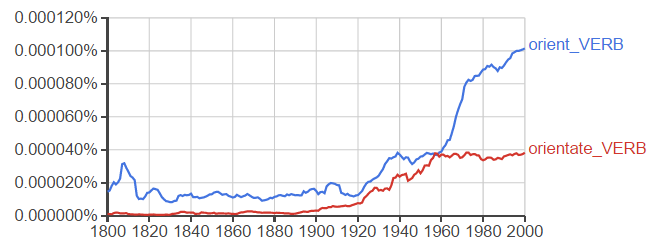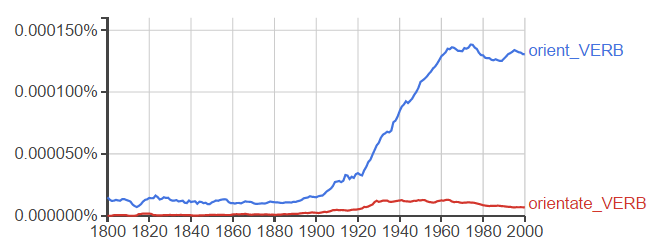The noun Orient comes from Latin oriens, which means “east”. The word was introduced into English as a general designation for countries east of Europe—but what does that have to do with the verb “orient”?
English nouns can commonly be used also as verbs. For example, when you transfer heat to something, you heat it, and when you turn your face towards something, you face it. The verb “orient” comes from the noun “Orient” and originally meant “to make something face east”. Over the course of time, the meaning was generalized to “to direct something towards something”.
The noun form of “orient”, in the generalized sense, is “orientation”, just like the noun form of “expect” is “expectation”. The problem is that the verb “orient” is used much less commonly than the noun “orientation”, and people unfamiliar with the verb thought that the verb form was supposed to be “orientate” (as in “hesitation” and “hesitate”).
This (originally erroneous) form gained a lot of ground in British English (it is probably more common than “orient” in spoken British English) and is now commonly considered an acceptable variant of “orient” by British dictionaries. Some sources go as far as to say that “orientate” is the British variant of “orient” and that “orient” should be avoided by British writers.
Such a claim is not supported by actual statistical data. Take a look at the following graph (based on the Google Ngram Viewer), which shows the relative frequency of the verbs “orient” and “orientate” in British literature:

The graph clearly shows two things: That “orient” is the traditional variant (and “orientate” appeared much later), and that “orient” is also more common in modern British literature. While the Google Ngram Viewer is sometimes unreliable when it comes to British usage (because British reprints of American titles may be included in the data), I checked also in the British National Corpus, and even there the verb “orient” is more common than “orientate”.
In American literature, the case for “orient” is much more obvious:

“Orientate” is generally frowned upon in the US, and many people consider its usage to be a sign of a lack of education. When we take into account the negative connotations of “orientated” in American English and the fact that it is less common in written British English, I believe it is advisable to completely avoid the word “orientate” in any kind of formal spoken communication and in writing, no matter what English variety you speak or learn.
 Tip: Are you a non-native English speaker? I have just finished creating a
Tip: Are you a non-native English speaker? I have just finished creating a  Web App
Web App
